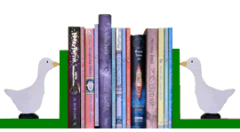 Somewhere between the ages of 5 and 9, children develop enough confidence and skill to start reading books by themselves. These newly confident readers provide a good market for children’s authors but, if you want to write for them, you need to think carefully about their needs.
Somewhere between the ages of 5 and 9, children develop enough confidence and skill to start reading books by themselves. These newly confident readers provide a good market for children’s authors but, if you want to write for them, you need to think carefully about their needs.
At this stage, reading is hard work so children are not going to do it unless it’s worth the effort. That’s why you need to give them strong stories with fast-moving plots that keep them turning the pages. Don’t think you can get away with weak stories because your readers are young. They are a very discerning audience and will give up on anything that’s boring.
Lengths and styles
Books for this age are short by adult standards (usually less than 8000 words), and divided into several chapters. (I find 650-1000 words is a good length.) These short chapters break the story into accessible chunks, help new readers see they are making progress and provide plenty of sensible places to stop. As with all fiction, it’s a good idea to put a strong hook at the end of each chapter to keep children wanting to know what happens next.
Newly confident readers (and others) can feel daunted when faced by pages of closely packed unbroken text. Try to keep paragraphs short and include plenty of dialogue to make pages look more accessible. Illustrations can help to break up the text too – at this stage, they are usually black and white line drawings. If you’re publishing your own books, use an easy-to read font but beware of making the letters too big as that can put off readers by looking too childish. Increasing the space between the lines makes reading easier without making the book look too young.
Readability
It’s important that your writing is simple enough for new readers to tackle. Don’t use a long word when a shorter one would be work just as well, and try to choose names that are spelt phonetically so children can sound them out. But don’t let that put you off long words completely. Sometimes they are just what you need, and tyrannasaurus might cause less problems to young readers than cough.
Readability isn’t just about individual words. It also applies to sentences. At this stage, children are reading one word at a time so they may work their way slowly through a complex sentence without understanding what it means. To stop that happening, keep your sentences short and simple, avoid sub-clauses and use full stops rather than semi-colons or too many commas. Don’t worry if this leaves you starting a sentence with but. That’s perfectly acceptable these days, despite what you may have been told at primary school.
As an example, the relatively simple change from
Throwing off his invisibility cloak, Hector attacked the monster with the magic wand which had belonged to grandfather.
to
Hector threw off his invisibility cloak. Then he attacked the monster with his grandfather’s magic wand.
drops the reading age by 4 years without detracting from the story at all.
You can explore how to improve the readability of your own writing by cutting and pasting a piece of text into readability-score.com and editing it on screen. Be careful though – the results you’ll get are US grade levels, not age, and are only there as a guide. Don’t get so hooked on the numbers that your storytelling suffers.
Avoiding boredom
One of the best bits of advice I have ever been given is that everything we write should add humour, build character or move the story forward. That is especially important when writing for this age group. There’s no room here for lengthy descriptions, waffle or moralising. That doesn’t mean you can’t have any descriptions at all, but keep them short and concentrate on what’s essential to the story.
Building on success
Once children have enjoyed one book, they tend to want another that’s similar which is why series are so successful with this age group. (See our article on Writing a Series). Even if you prefer to write one-off stories, you can brand your books with similar covers to help young fans choose another one by you.
